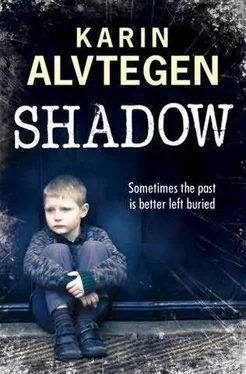Solveig took a quick look through the other wardrobe, then they both moved into the living room. This room was mainly furnished with older pieces. A bureau, a bookshelf and a more modern sofa – nothing that would generate large sums for the estate. A bed had been set up in front of the TV, and on the table next to it lay a TV guide, two scraped-off lottery tickets with no win, and a considerable array of medicines. They stood lined up on a piece of paper, cross-ruled with handwritten dates: Imdur, aspirin, Bisoprolol, Plavix, Plendil, citalopram, Pravachol.
It was amazing what society would do to keep people alive. Not to mention the enthusiasm of the pharmaceutical industry.
Like an exclamation mark amid the old-fashioned furnishings, a red push-button telephone sat on a small table inside the doorway. Marianne went over and leafed through a small stack of papers. A handwritten list of postal giro account numbers for radio service, telephone company and insurance. A notice from Söder Hospital. A supermarket flyer. A brochure from the chemist’s about the use of Bisoprolol. At the bottom lay a dog-eared address book. Marianne looked up the letter A. A handful of names and phone numbers were written with different pens, and all but two were crossed out. The sum total of a lifetime of acquaintances collected in a little book. One by one the links to the outside world had vanished and were then deleted.
Address books were her best tool in the search for relatives. She would ring all the numbers she found, in the hope of persuading someone to come to the funeral. When older people died, the numbers were often disconnected with no forwarding number. Occasionally so much time had passed that new subscribers had taken them over.
A sudden thought made her turn to the letter R. At the top of the column of names she found what she was looking for. Ragnerfeldt. The name was not crossed out.
‘Here are some photos.’ Solveig was kneeling in front of the old bureau with a brown envelope in her hand. Marianne put the address book in her bag and went over to her colleague, casting a glance inside the open bureau doors. Piles of neatly ironed tablecloths, crystal glasses of various designs, a Chinese-inspired coffee service. A red cardboard binder labelled Household Accounts on the spine. Marianne pulled it out and stuffed it into her bag.
‘I wonder if this is a picture of her? Looks like it’s from a birthday.’ Solveig turned it over. ‘Nothing written on it.’
She handed Marianne the picture. A faded colour photo of an elegantly dressed woman sitting in an easy chair surrounded by vases of flowers. Her hair was brushed back and fastened in a bun. Her face wore a serious expression, as if she wasn’t comfortable being the centre of attention.
Solveig took out another photo.
‘Look, here he is. That’s him, isn’t it?’
Marianne looked at the picture. Black-and-white this time. Axel Ragnerfeldt was sitting at a wooden table staring into the distance with a coffee cup in his hand. A woman of about the same age and two small children were also at the table, looking into the camera. A girl and a boy. The boy was a few years older.
Marianne nodded. ‘That’s definitely him. I didn’t even know he had a family.’
‘Maybe it’s not his.’
‘It looks like a family photograph.’
Marianne put the photo back in the envelope and stuffed it into her bag.
Solveig moved on to the bookshelf. ‘Here are some of his books.’
Marianne followed her.
‘Signed?’
Solveig opened a book. The florid signature flowed above the printed name, but this time without a personal greeting. Marianne pulled out another and flicked through the pages with her thumb. She gasped when she saw that all the pages were crossed out with a thick red marker. In certain places the text seemed to have particularly incensed who ever held the pen. Those pages had been obliterated with such force they were unreadable and the paper was almost torn.
‘Why the hell did she do that?’
They checked one book after another, and they had all been subjected to the same fate. The red lines shone blood-red on the pages, and here and there the pen had made small punctures. Marianne pulled out a book by a different author but found the pages untouched.
‘Hmm.’ She didn’t usually make comments, especially not about things that had taken place in the person’s own home and didn’t harm anyone else. But she found it odd, to say the least, that someone would intentionally destroy a signed book by Ragnerfeldt. Particularly in a home like this where the extra income from the sale of a valuable item might have been welcome. Perplexed, Marianne shoved the book back in place.
‘So, what do you think?’ said Solveig. ‘Do you have everything you need for now?’
Marianne opened her bag and took out the folder of inventory forms.
‘We just have to fill out one of these now.’
When the form was completed and Solveig had left, Marianne remained standing at the living-room window. She took in Gerda Persson’s view. A tree, a lawn, the dull green façade of a block of flats in the background. Behind those windows the lives and secrets of other people.
Everything she needed for the time being was packed into her bag. If no relatives contacted her after the death notice appeared, she would have to resort to the provincial records office and the church birth registry. And the names in the address book. She would do everything she could to find as many pieces of the puzzle as necessary to honour Gerda Persson at her funeral. Now her real work began. The hunt for Gerda Persson’s past.
She had already found one name.
Axel Ragnerfeldt.
‘No one had a greater influence on my father and his work than a man by the name of Joseph Schultz.’
With his finger poised over the name in his lecture notes, Jan-Erik Ragnerfeldt paused dramatically and gazed out over the large auditorium.
‘I don’t recall how old I was when my father first told me about Joseph Schultz, but I grew up with the story about the choice that he made and his fate. Joseph Schultz was my father’s ideal, his great model for humanity. And I remember that every time my father told me about him, I understood even more that although it’s good to think good thoughts, genuine goodness emerges only when one takes action.’
The spotlight was blinding him. He could only see the people in the front rows, but he knew that the rest were out there. An anonymous audience waiting devotedly for him to continue.
‘So who was this remarkable Joseph Schultz? Is there anyone here who has heard his name?’
He shaded his eyes with his hand. A woman was sitting in the front row over to one side of the stage. He had already noticed her, but now he took the opportunity to study her more closely. Lovely chiselled features. Her breasts swelled under a shimmering blouse with taut buttons, a little opening where they failed to close. The dark gap aroused his interest. He lowered his arm.
‘Joseph Schultz was a young soldier in the German Wehrmacht during the Second World War. On the twentieth of July 1941 he and seven of his fellow soldiers were in Smederevska Palanka on the Eastern Front. Their mission was to suppress the partisans’ resistance. It was the height of summer, harvest time, and Schultz and his detachment had been sent out on what they thought was a routine patrol…’
He stood quite still. A sudden movement would have broken the atmosphere he was building up. He had become very skilled at this; experience had fortified his self-confidence, and now he could do exactly as he liked. The privilege of success. The more confidence he had, the more charisma.
He shifted his gaze and let his eyes meet hers. He had made his choice. She was the one who would carry him through the evening, and he made it obvious enough that she would notice. That she had been chosen. And he felt the longed-for tingling sensation that came from standing there on stage and having the power to choose, while all she could do was acquiesce.
Читать дальше












